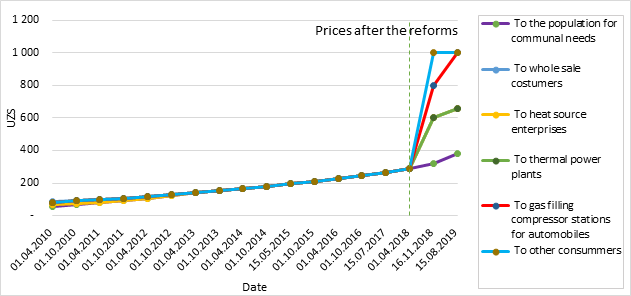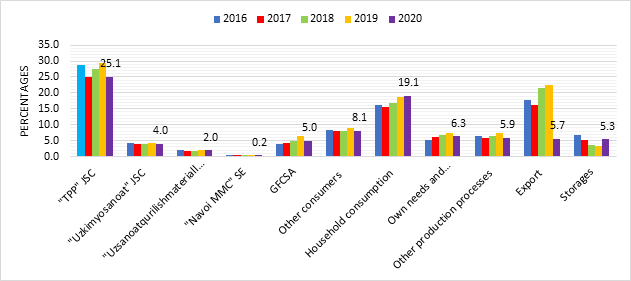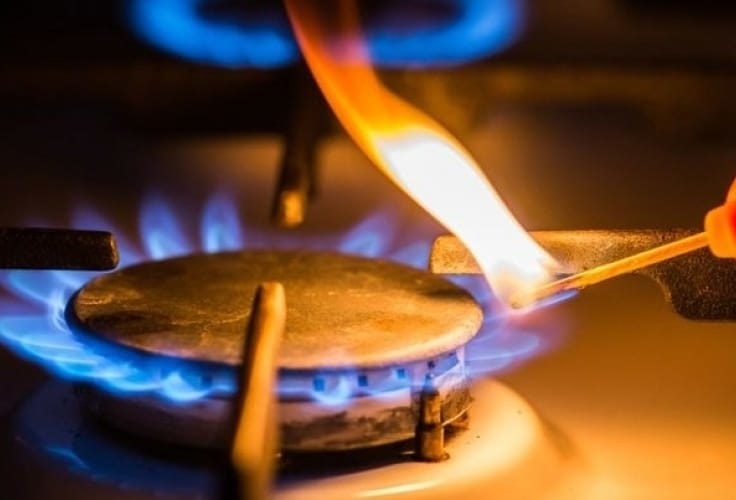The gas industry plays an important role in the economic development of Uzbekistan. It also serves as the main raw material for the development of transport, electricity, metallurgy, chemical industry, construction and a number of other industries.
In the forecast period for 2020-2025, the annual growth rate of the Uzbek oil and gas market is expected to be around 2.5%. The main factor of growth is the increase in demand for natural gas by the population and industrial enterprises. Uzbekistan ranks 11th in the world in terms of natural gas production and 14th in terms of natural gas reserves.
Reforms in the natural gas market of Uzbekistan in recent years
The government is taking steps to end the country's natural gas monopoly by setting new tariffs and ensuring private sector participation in the gas market. It should be noted that price liberalization is a key tool in solving problems in the current system and advancing mechanisms based on a market economy.
The Uzbek government has been implementing gradual reforms in the natural gas market for several years.
Fig 1. Dynamics of changes in gas prices for different consumers

In 2018, for the first time in Uzbekistan, reforms were implemented to liberalize prices and developed a procedure for applying differential rates of natural gas prices for different groups of consumers. For example, the price of natural gas sold for industrial sectors and gas stations increased by 3.8 times per cubic meter, and prices rose from 263 soums to 1,000 soums.
Prices paid by households rose 14 percent. However, the increase in prices during this period did not reduce the demand for total natural gas.
As a result of the reforms, over the past five years number of people regularly supplied with natural gas. In 2017, 3.2 million homes were supplied with natural gas, and by 2020 it will reach 3.5 million.
By Presidential Decree No. 4388 "On measures to ensure sustainable supply of energy resources to the population and the economy", two independent systems - JSC "Uztransgaz" and JSC "Hududgaztaminot" were established on the basis of JSC "Uztransgaz".
JSC "Uztransgaz" is responsible for:
- As the sole operator for the purchase and sale of natural gas, buys natural gas from production, processing facilities and conducts foreign trade related to natural gas.
- Also, sales to consumers connected to the gas distribution network on the basis of commission agreements with JSC "Hududgaztaminot";
- JSC "Hududgaztaminot" is responsible for the purchase, supply, storage and sale of liquefied gas to the population and social facilities.
As a result of these gas market reforms, the composition of participants in the distribution of natural gas is changing significantly. The share of gas distribution by JSC "Hududgaztaminot" has been growing since 2016 and in 2020 amounted to 51% of gas distribution in the country. Uztransgaz supplies gas to large, strategically important industrial enterprises, such as thermal power plants (98%) and the chemical industry (93%). The total technical losses and production needs of JSC "Uztransgaz" account for 78% of natural gas lost in the country during the year. Hududgaztaminot accounts for 22% of these losses, which indicates the high efficiency of the distribution for Hududgaztaminot JSC.
In addition, according to PD-4388, by 2025 it is planned to attract investors to Uzbekneftegaz and Uztransgaz through initial and secondary public offering in the domestic and international stock markets. As a result, gas production will reach 41.1 billion km in 2021 and 42.3 billion km in 2024.
There are many problems and shortcomings in the natural gas market in the country, and most of them are being addressed step by step:
- Low natural gas prices compared to Central Asia and other countries are the main reason for inefficient use of natural gas.
- Incomplete supply of natural gas to households and industries.
- Outdated infrastructure.
- High energy intensity in the country.
Unfortunately, due to inefficient management and outdated infrastructure and lack of investment in modern technologies, the potential of the gas industry in the country is not fully developed. According to the Institute of Geology, Oil and Gas Exploration, 63.1% of Uzbekistan's territory has oil and gas production potential.
In order to support the population and industrial enterprises, gas prices have been kept low for many years at export market prices, which has led to inefficient use of natural gas by the population and industrial enterprises. In addition, low-priced tariffs on gas prices have also significantly reduced investor interest. Lack of investment and outdated infrastructure have also negatively affected the level of natural gas supply to consumers. Exports in the event of a gas shortage were used as a mechanism to reduce the gap between gas prices in the country and export prices. Given that 3/4 of natural gas was sold to the domestic market at low prices, the natural gas infrastructure was left without funding.
Due to the cold weather in winter in the country, the demand for natural gas almost doubles. Changes in natural gas consumption are cyclical. In other words, the country consumes an average of 4.5 billion cubic meters (μm) of natural gas in winter and 2.4 μm of natural gas per month in summer. The decline in demand for natural gas in the summer will make it possible to store natural gas in special warehouses and ensure uninterrupted gas supply when demand increases. However, there are not enough dedicated underground storage facilities in the country to store gas.
Modernization of Uzbekistan's gas transmission system is crucial for the development of the gas market. More than half of the country's 13,000 km of main gas pipelines are over 30 years old and it is time to replace 58% of gas compressor units. The existing infrastructure related to the transportation and storage of natural gas plays an important role in the delivery of natural gas to consumers without losses.
Thermal power plants (TPPs) use about 93.5% of natural gas as raw material in production, which accounted for 30% of total gas consumption in 2019 by TPPs. Due to the limited alternative energy sources and the fact that most of the existing thermal power plants are about 40% obsolete, a large part of natural gas resources is being lost.
Indicators of the natural gas market in Uzbekistan
In 2016-2020, the volume of natural gas production in Uzbekistan increased by an average of 8.1% annually. However, the volume of natural gas production by Uzbekneftegaz has a tendency to decrease. Between 2008 and 2018, proven natural gas reserves fell by 4 percent.
The total consumption of natural gas in 2020 amounted to 54.1 billion cubic meters. Electricity generation in 2020 consumed about 25% of the natural gas supplied to the economy.
Fig 2. Dynamics of the share of natural gas supplied to consumers in 2016-2021

Households ranked second in terms of natural gas consumption. Demand for natural gas in 2020 increased by 32% compared to 2016 due to population growth and the construction of additional housing.
The export market is also a major consumer of natural gas in Uzbekistan. In the last 5 years, about 20 percent of natural gas has been exported excluding 2020. In 2020, only 5.7% of natural gas was exported to other countries. Total exports of natural gas will reach 12.2 billion cubic meters in 2019 and 3.5 billion cubic meters in 2020. meters. Uzbekistan plans to suspend natural gas exports by 2025 and provide the domestic market with a full supply of uninterrupted gas and export of high value-added gas products.
The amount of foreign direct investment in the natural gas market, especially in gas production and processing facilities, is increasing. Foreign direct investment increased by 31% in 2020 compared to 2016 and amounted to $16.2 billion in 2016 and $21.2 billion in 2020.
Another area of reform that needs to be implemented in Uzbekistan is to increase the efficiency of gas consumption by households. Consumption of natural gas in the country compared to other countries with similar climatic conditions, the share of households in energy consumption in Uzbekistan, mainly natural gas, is 25% of total energy sources. This figure is much higher compared to developed countries. For example, Finland has 14.9%, Switzerland 21.5% and the United States 11.5%.
Conclusion
As a result of low natural gas prices and limited measures to save gas, Uzbekistan has one of the highest energy intensity in the world, even in terms of development. In 2010, this figure was 2.3 times higher than in China, 6.6 times higher than in Turkey and 11.4 times higher than in Germany.
Further development of the natural gas market and efficient use of natural resources require in-depth science-based reforms. This can be seen from the experience of developed and developing countries. For example, in China, Mexico, Turkey and European countries, natural gas prices have been partially or completely liberalized and have been the basis for achieving high efficiency in natural gas production, distribution and consumption by increasing private sector share and creating a competitive environment in almost all segments of the gas market. Efficient use of natural gas will save another 9.2 billion cubic meters of natural gas from household consumption alone. This means that within a year, households will be able to use their current gas consumption for two years.
In addition, the demand for natural gas in the country can be significantly reduced through the modernization of the electricity generation system and the development of alternative energy sources.
Based on the analysis and the experience of developed countries, the following recommendations were developed:
- Economic incentives for innovations aimed at increasing efficiency in natural gas consumption;
- Introduction of preferential lending system to finance household investments aimed at increasing the efficiency of natural gas consumption;
- Further increase the role of the private sector in the production, transportation and distribution of natural gas and create a competitive environment between them.
- Introduction of a quota system for consumers in order to increase the efficiency of natural gas use.
Abdurashid Bozorov
Center for Economic Research and Reform
Chief Research Fellow





















leave a comment